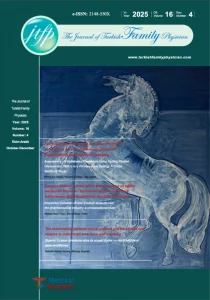The relationship between resident doctors’ attitudes towards brain drain and their life satisfaction and proactive personality traits
Aim: Our objective was to investigate the magnitude of brain-drain trends and influencing factors in a group of resident medical doctors in Istanbul/Türkiye.
Materials and Methods: Data were collected in January-February/2022 through a questionnaire containing the Attitude Scale for Brain Drain (ASBD), Satisfaction with Life Scale (SWLS), Abbreviated Proactive Personality Scale (APPS). The calculated sample size was 263 and was selected by stratified-sampling. Approvals were received from the Dean of Marmara University, local ethics committee (07.01.2022/09.2022.141), and also informed consent forms were collected from the participants for this cross-sectional study.
Results: The median-age was 28.0 years (28.4±2.5, 23-41). A high tendency toward brain-drain (62.8±9.4) and highly proactive personality traits (median: 51.0) were found, where as levels of satisfaction with life were low (17.1±6.2). The tendency towards brain-drain showed a positive correlation (r: 0.20, p=0.002) with the proactive personality traits and an inverse correlation with life satisfaction (r:-0.42, p=0.001), Only proactive personality traits (OR: 1.03, %95CI 1.00-1.06) and satisfaction with life (OR: 0.8, %95CI 0.82-0.93) measures seem to affect the brain-drain.
Conclusion: We found that the resident doctors have a low level of satisfaction with their lives, have high proactive personal traits and have a high tendency toward brain drain.
References
- Tezcan M. Beyin göçü ve Türkiye. Amme İdaresi Dergisi 1971;4(3):44-71.
- Lin N. A network theory of social capital. The handbook of social capital. 2008;50(1):69.
- Özdemir A, İlhan A. Beyin göçü: Öğrencileri yurt dışı eğitime yönlendiren sebepler bağlamında nitel bir araştırma. İstanbul Ticaret Üniversitesi Sosyal Bilimler Dergisi 2021;20(42):1159-86.
- Gökbayrak Ş. Uluslarası göç ve kalkınma tartışmaları: Beyin göçü üzerine bir inceleme. SBF Dergisi 2008;63(03):65-82.
- lveren AY, Toksoz G: Türkiye’de beyin göçü yazını ve bir alan araştırması. In“Gürhan Fişek’in İzinde Ortak Emek ve Ortak Eylem”. (eds)Karadogan E, Dertli YN, Milliogulları Ö, Kablay S, Akpınar T. Ankara, Siyasal Publication. 2018:191-214.
- Aksoy Z. Uluslararası göç ve kültürlerarası iletişim. Uluslararası Sosyal Araştırmalar Dergisi 2012;5(20):292-303.
- Sunar L. Türkiye’de mesleki itibar: Dönüşen çalışma hayatı ve mesleklerin sosyal konumu. Journal of Economy Culture and Society 2020;(Special Issue 1/Supplement 1):29-58.
- Tutkun OF, Koc M. Mesleklere atfedilen kalıp yargılar. Ankara Üniversitesi Eğitim Bilimleri Fakültesi Dergisi 2008;41(1):255-73.
- Budakoglu II, Kiyak YS, Coskun O. Tıp Fakültesine başvurudan meslek hayatına: Tıp öğrencisinin ülkelere göre eğitim ve kariyer serüveni. Tıp Eğitimi Dünyası 2020;19(59):108-22.
- Doğan E, Hıdıroğlu S, Karavuş M. Birinci basamak hekimlerinin hastalarla ilgili karşılaştıkları sorunların değerlendirilmesine yönelik niteliksel bir araştırma. Jour Turk Fam Phy 2017; 08 (1): 02-10.
- Abay ŞE. Hekim adaylarının hekim kimliğine ilişkin algıları: Hacettepe Üniversitesi Tıp Fakültesi metafor analizi örneği. Sürekli Tıp Eğitimi Dergisi 2017;26(1):1-8.
- Kart E. “Sağlıkta Dönüşüm” sürecinde performansa dayalı ücretlendirmenin hekimler üzerindeki etkileri. Çalışma ve Toplum 2013;38(3):103-140.
- Türk Tabipleri Birliği. Birlikte Kullanım Kapsamında Öğretim Üyelerine, Asistanlara Dayatılan Bireysel Sözleşmelere, Ek Ödeme Kesintilerine Karşı Meslektaşlarımızın Yanındayız. https://www.ttb.org.tr/haber_goster.php?Guid=e82b67ce-5faa-11eb-a370-4722d3be3ffd sayfasından 12/11/2024 tarihinde edişilmiştir.
- Beyazadam D, Kaya F, Tasdemir IM, Alimoglu O. Analysis of physical violence incidents against physicians in Turkey between 2008 and 2018. Turkish Journal of Trauma and Emergency Surgery 2022;28(5):641-7.
- Elmacioglu L. Hekimler göçü” tüm zamanların zirvesinde: Son 5 ayda 491’i uzman, 445’i pratisyen 936 hekim yurtdışı yolunda. https://independentturkish.com/node/516911/sa%C4%9Flik/hekimler-g%C3%B6%C3%A7%C3%BC-t%C3%BCm-zamanlar%C4%B1n-zirvesinde-son-5-ayda-491i-uzman-445i-pratisyen-936 adresinden 12/11/2024 tarihinde erişilmiştir.
- Bateman TS, Crant JM. The proactive component of organizational behavior: A measure and correlates. Journal of organizational behavior 1993;14(2):103-18.
- Liguori EW, McLarty BD, Muldoon J. The moderating effect of perceived job characteristics on the proactive personality-organizational citizenship behavior relationship. Leadership & Organization Development Journal 2013;34(4):344-64.
- Uncuoğlu YI, Çakmak AF. Proaktif kişilik ile proaktif çalışma davranışı ilişkisi üzerinde psikolojik güçlendirmenin etkisi. Uluslararası Yönetim İktisat ve İşletme Dergisi 2017;13(2):425-38.
- Dağlı A, Baysal N. Yaşam Doyumu Ölçeği’nin Türkçeye uyarlanması: Geçerlik ve güvenirlik çalışması. Elektronik Sosyal Bilimler Dergisi 2016;15(59): 1250-62.
- Adovor E, Czaika M, Docquier F, Moullan Y. Medical brain drain: how many, where and why? Journal of Health Economics 2021;76:102409.
- Öncü E, Selvi H, Vayısoglu SK, Ceyhan H: Hemşirelik öğrencilerinde Beyin Göçüne Yönelik Tutum Ölçeği geliştirilmesi: Güvenirlik ve geçerlik çalışması. Çukurova Medical Journal 2018;43(1):207-15.
- Akin A, Abaci R, Kaya M, Arici N. Kısaltılmış proaktif kişilik ölçeği’nin (KPÖ) Türkçe formu. Paper presented at the ICES11 International Conference on Educational Sciences, Famagusta, Cyprus, 2011.
- Crant JM. Proactive behavior in organizations. Journal of management. 2000;26(3):435-62.
- Hameed I, Brohi S, Shahab A. Impact of proactive personality on career adaptability and their intentions for expatriate. Canadian Journal of Career Development 2020;19(1):04-13.
- Mollahaliloglu S, Culha UA, Kosdak M. The migration preferences of newly graduated physcians in Turkey. Medical Journal of Islamic World Academy of Sciences. 2014;22(2): 69-75.
- World Economic Forum. World Economic Forum’s Global Gender Gap Report 2021 [Internet]. Accessed from https://www.weforum.org/reports/global-gender-gap-report-2021 adress on 12/11/2024.
- Kacar G. Türkiye’de beyin göçü ve tersine beyin göçü olgu-larının değerlendirilmesi. Yüksek Lisans Tezi. Eskişehir Osmangazi Üniversitesi, Eğitim Bilimleri Enstitüsü / Yüksek-öğretimin Yönetimi ve Politikası Ana Bilim Dalı, 2016.
- Öneri I. Türkiye’den Beyin Göçü (2007-2017). Tezsiz Yüksek Lisans Projesi. Pamukkale Üniversitesi, Eğitim Bilimleri Enstitüsü, 2019.
- Gungor ND, Tansel A. Brain drain from Turkey: An empirical investigation. ERC (Economic Research Center) Economic Research Center, Middle East Technical University 2004;4(02):1-10.
- Türk Tabipler Birliği. Asistan Hekim Olmak Çalıştay Raporu [Internet]. Accessed from https://www.ttb.org.tr/userfiles/files/Asistan%20Hekim%20Olmak%20Calistay%20Raporu(1).pdf on 12/11/2024.
- Eryurt MA, Arslan H, Gunes K, Bani B. Turkey Demographic and Health Survey 2018 advanced analysis study [Internet]. Accessed from http://www.openaccess.hacettepe.edu.tr:8080/ xmlui/bitstream/handle/ 11655/25746/TNSA_2018_ileri_analiz_raporu.pdf?sequence=1&isAllowed=y on 12/11/2024.
- Dikmetas E, Top M, Ergin G. An examination of mobbing and burnout of residents. Turkish Journal of Psychiatry 2011;22(3):137-49.
- Altınok R. Pamukkale Üniversitesi Hastanesi’nde Çalışan Asistan Hekimlerin Şiddete Maruziyet Sıklığı ve İlişkili Etmenler. Aile Hekimliği Uzmanlık Tezi. Pamukkale Üniversitesi Tıp Fakültesi, Aile Hekimliği Anabilim Dalı, Denizli, 2018.
- Anastasiou E, Anagnostou G, Theodossiou G, Papamargaritis V. Physicians’ brain drain: Investigating the determinants to emigrate through empirical evidence. International Journal of Business and Economic Sciences Applied Research 2020;13(1):31-41



